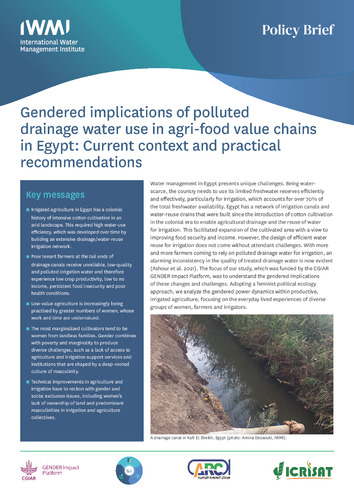Gendered implications of polluted drainage water use in agri-food value chains in Egypt: current context and practical recommendations
Abstract
Water management in Egypt presents unique challenges. Being waterscarce, the country needs to use its limited freshwater reserves efficiently and effectively, particularly for irrigation, which accounts for over 70% of the total freshwater availability. Egypt has a network of irrigation canals and water-reuse drains that were built since the introduction of cotton cultivation in the colonial era to enable agricultural drainage and the reuse of water for irrigation. This facilitated expansion of the cultivated area with a view to improving food security and income. However, the design of efficient water reuse for irrigation does not come without attendant challenges. With more and more farmers coming to rely on polluted drainage water for irrigation, an alarming inconsistency in the quality of treated drainage water is now evident (Ashour et al. 2021). The focus of our study, which was funded by the CGIAR GENDER Impact Platform, was to understand the gendered implications of these changes and challenges. Adopting a feminist political ecology approach, we analyze the gendered power dynamics within productive, irrigated agriculture, focusing on the everyday lived experiences of diverse groups of women, farmers and irrigators.

